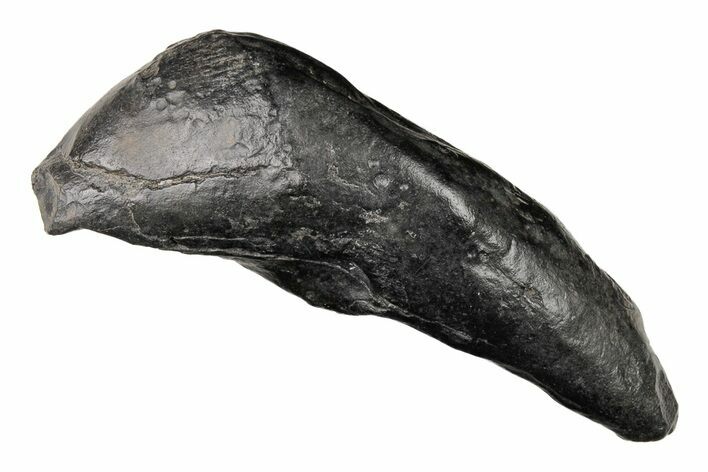This Specimen has been sold.
Large, 5.4" Fossil Sperm Whale (Scaldicetus) Tooth - South Carolina
This is a large, 5.4" long, Miocene aged, fossil Sperm Whale (Scaldicetus sp) tooth collected from a river in South Carolina. It was found associated with fossil shark teeth including those of the Megalodon. These whales would have been a food source for the gigantic Megalodon sharks living during the same time period.
About Scaldicetus
Scaldicetus was a genus of prehistoric sperm whale that roamed the oceans during the Miocene epoch, roughly 15 to 10 million years ago. Unlike modern sperm whales, Scaldicetus was a formidable predator equipped with large, conical teeth in both its upper and lower jaws—adaptations suggesting it actively hunted large prey, including other marine mammals.
Fossils of Scaldicetus have been discovered across Europe, North America, and Africa, often as isolated teeth and jaw fragments. These teeth are distinctive: robust, heavily worn, and frequently broken—evidence of powerful bites and possibly aggressive feeding behavior. This wear pattern is one of the reasons Scaldicetus and similar fossil sperm whales are sometimes referred to as "macroraptorial" sperm whales.
Though not much of its skeleton has been recovered, Scaldicetus is believed to have been comparable in size to modern sperm whales, possibly reaching lengths of 40 feet or more. Its presumed lifestyle parallels that of apex predators like Orcinus orca (killer whales), dominating ancient seas with brute strength and a carnivorous appetite.
Scaldicetus is also a historically important genus, as it was among the first fossil sperm whales to be named. However, due to fragmentary remains and uncertain relationships, some paleontologists now consider it a "wastebasket taxon"—a genus where various unrelated fossils have been lumped together until further research can resolve their proper classification.
Scaldicetus was a genus of prehistoric sperm whale that roamed the oceans during the Miocene epoch, roughly 15 to 10 million years ago. Unlike modern sperm whales, Scaldicetus was a formidable predator equipped with large, conical teeth in both its upper and lower jaws—adaptations suggesting it actively hunted large prey, including other marine mammals.
Fossils of Scaldicetus have been discovered across Europe, North America, and Africa, often as isolated teeth and jaw fragments. These teeth are distinctive: robust, heavily worn, and frequently broken—evidence of powerful bites and possibly aggressive feeding behavior. This wear pattern is one of the reasons Scaldicetus and similar fossil sperm whales are sometimes referred to as "macroraptorial" sperm whales.
Though not much of its skeleton has been recovered, Scaldicetus is believed to have been comparable in size to modern sperm whales, possibly reaching lengths of 40 feet or more. Its presumed lifestyle parallels that of apex predators like Orcinus orca (killer whales), dominating ancient seas with brute strength and a carnivorous appetite.
Scaldicetus is also a historically important genus, as it was among the first fossil sperm whales to be named. However, due to fragmentary remains and uncertain relationships, some paleontologists now consider it a "wastebasket taxon"—a genus where various unrelated fossils have been lumped together until further research can resolve their proper classification.
SPECIES
Scaldicetus sp.
LOCATION
River In South Carolina
FORMATION
Hawthorn Formation
SIZE
5.4" long
CATEGORY
SUB CATEGORY
ITEM
#204274
We guarantee the authenticity of all of our specimens.
 Reviews
Reviews











